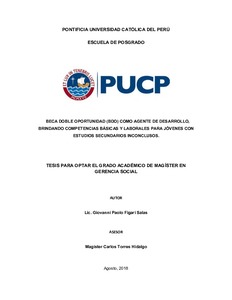| dc.contributor.advisor | Torres Hidalgo, Carlos | |
| dc.contributor.author | Figari Salas, Giovanni Paolo | es_ES |
| dc.date.accessioned | 2019-02-01T17:39:41Z | es_ES |
| dc.date.available | 2019-02-01T17:39:41Z | es_ES |
| dc.date.created | 2018 | es_ES |
| dc.date.issued | 2019-02-01 | es_ES |
| dc.identifier.uri | http://hdl.handle.net/20.500.12404/13371 | |
| dc.description.abstract | Esta investigación busca establecer si Beca Doble Oportunidad BDO está cumpliendo con el objetivo principal de asegurar que los beneficiarios culminen la Educación Básica Secundaria (Cuarto y quinto de secundaria), además de dotarlos de competencias personales y laborales, herramientas necesarias para acceder a mejores oportunidades de empleo o el acceso a emprendimientos y negocios propios.
BDO es una iniciativa del Estado peruano a través de PRONABEC que promueve el acceso educación básica regular EBR, de nivel secundario, y una certificación laboral que brinde competencias sociales y laborales a jóvenes de 17 a 25 años con rezago escolar. Se ha identificado que los principales factores que influyen a que estos jóvenes abandonen la EBR son los problemas económicos y sociales. El Abandono de la EBR trae consigo la exclusión laboral, financiera y social, al tener estudios inconclusos, las oportunidades de crecimiento personal y laboral se limitan a realizar trabajos informales, sin beneficios sociales como acceso a salud y fondo de pensiones, por ende, no contribuyen al fisco, actividades como mototaxistas, trabajadoras del hogar, estibadores, etc. En un país con alta informalidad, se requiere medidas efectivas para controlar la deserción escolar, BDO tiene como propósito integrar a estos jóvenes alejándolos de situaciones de riesgo y de la exclusión social de la que son parte. El programa se encuentra actualmente focalizado en distritos con alto riesgo de criminalidad. La percepción de los becarios es que BDO está afectando de manera positiva en sus vidas, sin embargo, consideramos que las 400 becas ofrecidas por PRONABEC solo cubre el 0.05% del total de potenciales beneficiarios. En las recomendaciones y la propuesta de valor se propone una alianza con empresas privadas y otras entidades del gobierno para que estas financien o apadrinen becas y de esta manera incrementar la oferta de becas que se puedan ofrecer. | es_ES |
| dc.description.abstract | This research seeks to establish whether the BDO Double Opportunity Grant is fulfilling the main objective of ensuring that the beneficiaries complete the Secondary Basic Education (Fourth and Fifth Secondary Level), in addition to providing them with personal and work skills, necessary tools to gain access to better opportunities of employment, entrepreneurship or small businesses.
BDO is an initiative of the Peruvian government through PRONABEC that promotes access to basic EBR, secondary education, and a labor certification that provides social and employment skills to young people from 17 to 25 years of age with a backlog. It has been identified that the main factors that influence these young people to leave the EBR are economic and social burdens. The abandonment of the EBR brings labor, financial and social exclusion. Having inconclusive studies, opportunities for personal and work growth are limited to informal work, without social benefits such as access to health and pension funds. Therefore, they do not contribute with taxes to the treasury, because they do informal jobs such as mototaxistas, domestic workers, markets stevedores, etc. In a country with high informality, effective measures are required to control school dropouts; BDO aims to integrate these young people away from situations of risk and social exclusion of which they are part. The program is currently focused on districts with a high risk of crime. The recipients' perception is that BDO is affecting their lives positively, however, we consider that the 400 scholarships offered by PRONABEC every year only covers 0.05% of the total potential beneficiaries. The recommendations and the added value of this research propose an alliance with private companies and other government entities, so that they finance or sponsor scholarships and thus increase the offer of scholarships that can be granted to this disadvantaged young population. | es_ES |
| dc.description.uri | Tesis | es_ES |
| dc.language.iso | spa | es_ES |
| dc.publisher | Pontificia Universidad Católica del Perú | es_ES |
| dc.rights | info:eu-repo/semantics/openAccess | es_ES |
| dc.rights.uri | http://creativecommons.org/licenses/by-nc-nd/2.5/pe/ | * |
| dc.subject | Becas (Secundaria y superior) | es_ES |
| dc.subject | Deserción escolar | es_ES |
| dc.subject | Educación tecnológica | es_ES |
| dc.subject | Adolescencia | es_ES |
| dc.title | Beca doble oportunidad (BDO) como agente de desarrollo, brindando competencias básicas y laborales para jóvenes con estudios secundarios inconclusos | es_ES |
| dc.type | info:eu-repo/semantics/masterThesis | es_ES |
| thesis.degree.name | Maestro en Gerencia Social | es_ES |
| thesis.degree.level | Maestría | es_ES |
| thesis.degree.grantor | Pontificia Universidad Católica del Perú. Escuela de Posgrado | es_ES |
| thesis.degree.discipline | Gerencia Social | es_ES |
| renati.discipline | 314127 | es_ES |
| renati.level | https://purl.org/pe-repo/renati/level#maestro | es_ES |
| renati.type | http://purl.org/pe-repo/renati/type#tesis | es_ES |
| dc.publisher.country | PE | es_ES |
| dc.subject.ocde | https://purl.org/pe-repo/ocde/ford#5.09.00 | es_ES |






